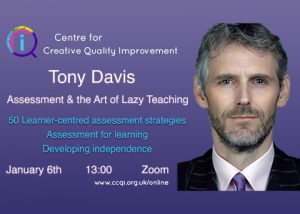Assessment Art

All of the problems start with the phrase: Teaching, Learning AND Assessment. Well, maybe not all, but a lot of them, certainly. There does seem to be a strong logic to the sentence – you teach, they learner, you check what they’ve leant – but that logic is as fundamentally flawed as it is widely accepted.
I’ve been privileged to be able to ask hundreds of teachers to define assessment in order to check out my hypothesis, and almost every time their definition is of summative assessment. But there’s only one place for summative and that’s just before learners walk out of the door at the end of the programme; or at the end of a unit of study they won’t be returning to. This is no surprise when ‘Assessment’ always gets popped at the end of the offending phrase.
I spend my life evaluating the impact of teaching and assessment strategies on Learning. Assessment in this context is: ‘assessment for learning’, or ‘formative assessment’, or ‘INformative assessment’. This is where assessment is a catalytic act – leading learners to learn yet more.
And there’s something else I have a problem with too: my dear old Ofsted colleagues. Have you ever sat down and analysed their inspection findings around assessment? Here are a couple of very popular criticisms from them:
‘Teachers do not effectively check the learning that has taken place.’
‘Teachers do not know whether learners have understood or retained prior learning.’
It’s not the factual accuracy of this that I’m challenging, it’s (rather ironically) the fact that Ofsted doesn’t seem the slightest bit concerned about the impact this has on providers’ work.
Here’s what I see happening (and I’d be interested to know if you’ve experience this too):
- A provider is given one of these criticisms of their assessment practice.
- The provider adds the ‘weakness’ to their development plan.
- Teachers are made to do more assessment.
But Plan A should never be for learners to become dependent on the teacher for an evaluation of the quality of their work. Plan A is that we equip learners with the skills to be able to assess themselves, then use the expert learning strategies we’ve helped them develop to be able to take their own work forward. BTEC clearly understand this, as they won’t allow us to feedback on assessed work. And I agree – the provenance of a learner’s work should never be in doubt.
Plan A, then, should be to equip learners with critical-reflection skills. Plan B is for the teacher to mop up if required. Have a look at this wonderful piece of poetry from Royce Sadler, circa 1989:
‘The indispensable conditions for improvement are that the student comes to hold a concept of quality roughly similar to that held by the teacher, is able to monitor continuously the quality of what is being produced during the act of production itself, and has a repertoire of alternative moves or strategies from which to draw at any given point. In other words, students have to be able to judge the quality of what they are producing and be able to regulate what they are doing during the doing of it’.
But in very many observations and analyses of lesson plans, it’s clear that the dominant assessment strategies employed are: teacher-centred Q&A, observation and marking.
In the Assessment & the Art of Lazy Teaching session, delegates work through a carefully choreographed introduction to fifty different assessment strategies, none of which are about teacher-centred Q&A, observation or marking. And by the end of the session, delegates will have planned a ‘research lesson’ in which they’re going to experiment with their favourites. Here’s the sort of things previous delegates have said:
- ’50 Shades of Great! Attitude-shifting journey.’
- ‘Change is in the air! I am definitely going to implement the strategies learnt in this session.’
- ‘Purposeful, creative, engaging.’
- [I need to] ‘Reflect and challenge my own pedagogy to ‘reboot’ as sometimes we get lost in all the other noise.’
- ‘Really enjoyed the Community Challenge game and the chance to apply the strategies to given scenarios and discuss differing perspectives.’
It would be lovely to have you or some of your team join us for this session on Wednesday January 6th at 13:00. Could be the start of a great New Year’s resolution. And I hope it goes without saying, that when teachers get this right, the workload goes down.
For more information, visit: Assessment & the Art of Lazy Teaching
Other online workshops can be found on our home page: www.ccqi.org.uk
To join the CCQI Research Network, do please click here.




Comments
No comments yet